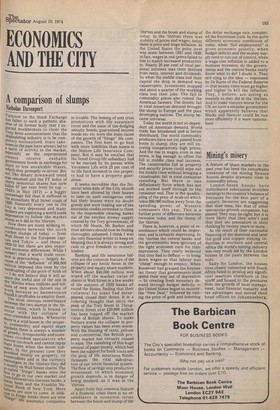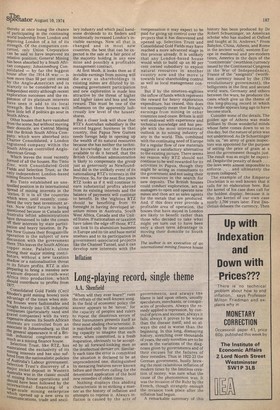Mining's misery
A feature of share markets in the past year has been the remarkable weakness of the mining finance houses despite dramatic rises in commodity prices.
London-based houses have contributed substantial invisible earnings to the country's balance of payments for the best part of a century. Investors are suggesting that their time, like that of other spectacular growth companies, has passed. They may be right, but it is more likely that they aren't and that they are premature in their thinking by twenty years or more. As the result of their successful financing of the diamond and later the gold and copper mining industries in southern and central Africa the world's mining industry was very much led by the London houses in the years between the wars.
Sadly for London, the houses most closely connected with South Africa failed to develop any significant interests elsewhere in the world and bowed to the pressures from the growth of local management, local financial maturity and tax advantages and moved their head offices to Johannesburg,
thereby at once losing the chance of participating in the continuing world leadership from London and depriving London of a lot of its strength. Of the companies concerned, only Union Corporation. can be said to have improved its relative position; General Mining has been absorbed by a South African company; Johannesburg Consolidated — by far the biggest house after the 1914-18 war — is now more than 50 per cent owned by the Anglo-American and is scarcely to be considered as an independent entity although recent exploration successes and the expansion of its platinum interests have seen it add to its local strength. But these houses will have little left if politics go sour in South Africa.
Other houses that have vanished from the scene, but without moving their domicile, are Central Mining and the British South Africa Company, which were absorbed into Charter Consolidated, a London registered company within the South African controlled AngloAmerican Group. Which leaves the most recently formed of all the houses, Rio Tinto Zinc, with Consolidated Gold Fields and Selection Trust, as the °illy independent London-based mining finance houses.
Rio Tinto established an unequalled position in its international spread of mining interests in the sixties. It is in all the countries Which were, until recently, considered the very best investment areas. Now their future is being questioned because in Canada and Australia leftist administrations have threatened to take the cream off their interests by state participation and heavy taxation. In PaPua New Guinea their Bougainville operation is the subject of new discussion with the government there. This leaves the South African copper mine, Palabora, alone among their major mining conUibutors, without a new taxation shadow or a nationalisation threat to its future profits. RTZ is also Preparing to bring a massive new uranium deposit in south-west Africa into production, which should contribute to profits from 1977.
Consolidated Gold Fields (Cecil
• Rhodes's gold mining house) took advantage of the times when mining houses were fashionable and bought heavily into UK industrial cornpanies (particularly sand and gravel companies) with its very expensive shares. Its South African interests are controlled from an associate in Johannesburg, so that the general appearance is of a British industrial conglomerate as much as a mining finance house. Selection Trust, like RTZ, has Maintained the exclusivity of its Mining interests and has also suffered from the nationalistic policies Of Australia's Labour government. Selection Trust's discovery of a in. ajar nickel deposit in Western oArtralia was in the classic mould mining house operations and ,nould have been followed by the iInternational financing of a _n,r?e-scale mining enterprise noh opened up a new area to ornrnunications, trade and ancil
lary industry and which paid handsome dividends to its finders and incidentally increased London's invisible earnings. Now all that is changed and in most new countries, the best that can be expected is the sale at a fair price of the majority holding in any new mine and possibly a profitable management contract.
At first blush, it looks then as if invisible earnings from mining will die away as shareholdings in existing mines are diluted by increasing government participation and new exploration is made less attractive by the threat of higher and higher taxes and less and less reward. This must be one of the influences on the apparently ludicrously low level of the houses' shares.
But a closer look will show that RTZ's Australian subsidiary is the second biggest business in that country, that Papua New Guinea needs foreign help in opening up the wealth of its natural resources because she has neither the technical knowledge nor the finance available to do it herself, that the British Columbian administration is likely to compensate the group just as generously as Newfoundland did in the unlikely event of its nationalising RTZ's interests in the Province. So, for the next five years RTZ looks as if it will continue to earn substantial profits abroad from its existing interests and the balance of payments will continue to benefit. In the 'eighties RTZ should be benefiting from its foresight in having developed uranium mines in Australia, South West Africa, Canada and the United States. If nationalism or taxation have taken the edge off those, RTZ can look to its aluminium business in Europe and its tin and base metal smelters and to its participation in government-associated projects like the Channel Tunnel, and it can develop new interests with the
compensation it may expect to be paid for giving up control over the projects that it has discovered and opened up. Selection Trust and Consolidated Gold Fields may have reached a more advanced stage in this process already. It is unlikely that any London-based house would wish to build up an 80 per cent owned subsidiary to exploit natural resources in another country now and the move is towards local shareholding control as well as local management control.
But if by the nineteen-eighties the inflow of funds which represent the reward for heavy exploration expenditure, has ceased, this does not necessarily mean that Britain's earnings from mining in other countries need cease. Britain is still well endowed with experience and technical knowledge and has people with the most international outlook in its mining industry of any in the world. This, combined with the continuing need of Europe for a regular flow of raw materials suggests a satisfactory alternative to the existing picture. There seems no reason why RTZ should not continue to be well rewarded for its activities in Papua, though they might be acting as consultants to the government and not using their own resources in the search for new deposits. The British houses could conduct exploration, act as managers to open and operate new mines and then act as sales agents for the metals that are produced. And, if this does ever provide a profitable area of operation, the houses that have stayed in London are likely to benefit rather than those who decided to take what might yet turn out to have been only a short term Advantage in moving their domicile to South Africa.
The author is an executive of an international mining finance house

































 Previous page
Previous page